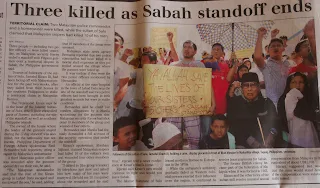Hantu Laut
Another gunfight ensued in Semporna and one of our policemen killed and one injured.
As I have predicted correctly there are sympathisers in our midst and the Semporna incident is just the beginning.
What next?
Are we just going to let these bastards continue enjoying the pleasures of our hospitality and kill our people, or we take drastic action to contain the problem by radical means before it gets out of hand.
Philippines President Aquino is a disgrace giving his time of day talking to the pretender Sultan (there are about half a dozen of them claiming to be the rightful heir to a non-existence throne, including one residing in Kg.Likas in KK), and they making a mockery of his impotent order. No suluks respect him, because he is inept, unfit and powerless to do what a president should have done.
Where in the world a private citizen is allowed to form his own army.
Only in the Philippines, where law of the jungle prevails.
That by itself is already a crime and Aquino talking to the donkey is insulting the office of the presidency.
He is certainly a lame duck president and wet behind the ears and how the Filipino people can tolerate such kind of president is beyond comprehension.
To save his own skin he now mulls taking the Sulu claim to the International Court.
First, let me ask him, does the Philippines government recognise legal entity of the Sultanate of Sulu in the present. If it does than he has to make the man as the Sultan or King of the whole of Philippines before he can lay claim to Sabah.
The Malaysian government should demand the Philippines government to arrest the bogus Sultan and charge him for murder. He has blood on his hand for the death of three of our security forces personnel.
Sabahans have tolerated this nonsense long enough and have allowed these people to reside on our lands peacefully and provide them with jobs, education and other public amenities that available to Malaysians are also made available to them and see how they repay our gratitude.........with guns and bullets.
Our government have shown great restraint under very trying time but they cheated our security forces by declaring a surrender but started shooting when our forces guards are down. These are acts of cowardice.
As there are many rumours floating around of Anwar's involvement in this terrible tragedy, which I shall give him benefit of the doubt, but, nevertheless, full investigation must be carried out to clear his name or otherwise.
He is the only Malaysian leader who has close contact with Nur Misuari and the armed intrusion is supported by Misuari's faction.
Aquino should also investigate the claim of opposition Malaysian leader involvement from his side where the rumours first emerged.
Another gunfight ensued in Semporna and one of our policemen killed and one injured.
As I have predicted correctly there are sympathisers in our midst and the Semporna incident is just the beginning.
What next?
Are we just going to let these bastards continue enjoying the pleasures of our hospitality and kill our people, or we take drastic action to contain the problem by radical means before it gets out of hand.
Philippines President Aquino is a disgrace giving his time of day talking to the pretender Sultan (there are about half a dozen of them claiming to be the rightful heir to a non-existence throne, including one residing in Kg.Likas in KK), and they making a mockery of his impotent order. No suluks respect him, because he is inept, unfit and powerless to do what a president should have done.
Where in the world a private citizen is allowed to form his own army.
Only in the Philippines, where law of the jungle prevails.
That by itself is already a crime and Aquino talking to the donkey is insulting the office of the presidency.
He is certainly a lame duck president and wet behind the ears and how the Filipino people can tolerate such kind of president is beyond comprehension.
To save his own skin he now mulls taking the Sulu claim to the International Court.
First, let me ask him, does the Philippines government recognise legal entity of the Sultanate of Sulu in the present. If it does than he has to make the man as the Sultan or King of the whole of Philippines before he can lay claim to Sabah.
The Malaysian government should demand the Philippines government to arrest the bogus Sultan and charge him for murder. He has blood on his hand for the death of three of our security forces personnel.
Sabahans have tolerated this nonsense long enough and have allowed these people to reside on our lands peacefully and provide them with jobs, education and other public amenities that available to Malaysians are also made available to them and see how they repay our gratitude.........with guns and bullets.
Our government have shown great restraint under very trying time but they cheated our security forces by declaring a surrender but started shooting when our forces guards are down. These are acts of cowardice.
As there are many rumours floating around of Anwar's involvement in this terrible tragedy, which I shall give him benefit of the doubt, but, nevertheless, full investigation must be carried out to clear his name or otherwise.
He is the only Malaysian leader who has close contact with Nur Misuari and the armed intrusion is supported by Misuari's faction.
Aquino should also investigate the claim of opposition Malaysian leader involvement from his side where the rumours first emerged.


